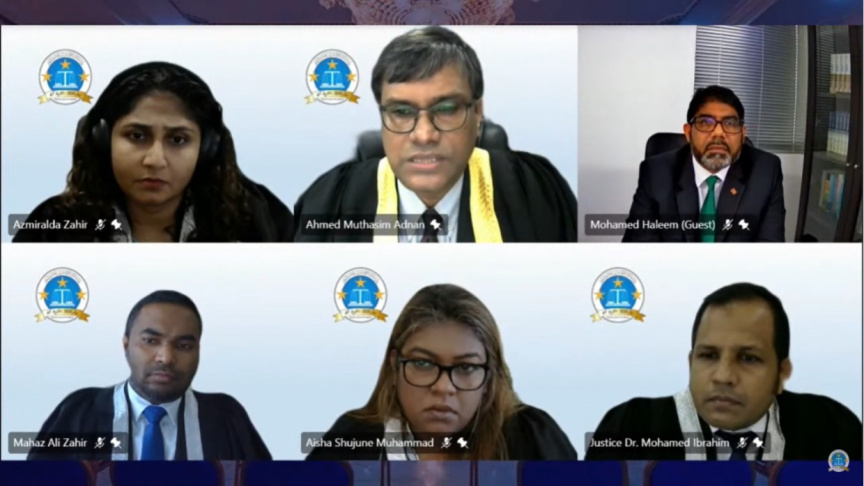
Supreme Court issues its judgment in a constitutional case lodged with the court over Parliament's decision to reduce the salaries of high-ranking State officials on November 4, 2020. (Photo/Supreme Court)
The Supreme Court ruled on Wednesday that it lacks the jurisdiction to look into a case lodged with the court which challenges the legality of a decision by the Parliament to impose salary reductions on high-ranking State officials including the President, Vice President, and heads of independent institutions.
The constitutional case was lodged with the Supreme Court by former Civil Court judge Mohamed Haleem back in June.
He asked the court to declare the Parliament’s decision as unlawful, arguing that salaries of officials whose salaries and allowances are determined under specific laws cannot be reduced without amending the laws in question.
The Supreme Court issued its judgment in the case earlier this Wednesday. The case was looked into by a bench of five justices – led by Chief Justice Ahmed Muthasim Adnan, and accompanies by Justice Mahaz Ali Zahir, Justice Dr. Azmiralda Zahir, Justice Aisha Shujune, and Justice Dr. Mohamed Ibrahim.
The Supreme Court cited Article 9 (b) and Article 11 of Judicature Act, and said that the court has the jurisdiction to adjudicate on constitutional issues with the three main characteristics as matters within the inherent jurisdiction of the court.
Matters within the inherent jurisdiction of the Supreme Court:
Haleem lodged the case as a constitutional issue concerning public interest of the nation.
However, the Supreme Court ruled he failed to sufficiently prove the case is a constitutional issue concerning public interest of the nation.
“Mohamed Haleem failed to prove to the court within judicial and legal standards that this case involves an issue concerning public interest of the nation that the Supreme Court has inherent jurisdiction as declared under Article 11 (3) of Law number 22/2010, Judicature Act of Maldives,” said the court, issuing its ruling.
The court ruled that rather than an issue involving public interest of the nation, the Haleem talked about the possible affects the decision could have on individual citizens, at an individual level.
The Parliament passed a report compiled by the Public Accounts Committee recommending a reduction in the salaries of officials whose salaries are determined by the Parliament, and who earn above MVR 20,000, to offset the fiscal repercussions of the COVID-19 pandemic on May 21.
The salaries and allowances of the President and Vice President are declared under President and Vice President’s Salaries and Benefits Act. Article 3 of the Act declares the salary of the President as MVR 100,000, while Article 10 of the Act declares the salary of the Vice President as MVR 75,000.